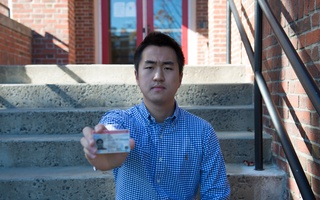{shortcode-973ce2d97b57c7571e1c89a5fbe068b2fa20b09e}
Four DACA recipients at the Medical School wrote an open letter last week calling on the nation to protect its undocumented students, as lawmakers are struggling to reach an immigration deal.
The four Medical School students—Anthony Tucker-Bartley, Alma J. Oñate Munoz, Blanca E. Morales Temich, and Dalia G. Larios Chavez—explained how the uncertainty surrounding the program affects them and other students across the country in a piece for WBUR addressed to their “fellow Americans.”
“Without DACA, there is no possibility of continuing the natural progression of medical training,” the letter reads. “DACA students will not be the only Americans to suffer from this. The communities we hope to serve will also be affected: your neighbors, your family, your friends, and even you.”
Morales Temich said she and her co-authors wanted to make the point that American society stands to benefit from allowing DACA recipients to live and work in the United States.
“At its core, the immigration issue is the ability for people to be fully integrated into society and to make meaningful contributions,” she said.
In the letter, the students wrote about the potential for thousands of DACA recipients to “diversify the physician pool” by entering the medical workforce.
President Donald Trump announced in September he would end Deferred Action for Childhood Arrivals, an Obama-era program that provided legal protections to undocumented immigrants brought to the country as children. In recent weeks, enshrining these protections into law has become a flashpoint of debate on Capitol Hill, as lawmakers face deadlines for reaching a deal on the issue.
Since September, the Medical School students have met with multiple Harvard administrators— including George Q. Daley ’82, dean of the Medical School, and Fidencio Saldaña, the school’s dean of students—to discuss their status and the University’s position toward DACA. Saldana wrote in an email the school is “proud” of its undocumented students.
“It is vitally important that we find a permanent solution that will enable them to continue their medical training and enrich our society as physicians,” Saldaña wrote.
The students who wrote the letter said the medical training process presents challenges for undocumented students at multiple stages. They specifically named residency—a period of in-hospital training after medical school—as difficult to navigate.
“What makes the residency process difficult is that, essentially, it’s like a hiring process,” Larios Chavez said. Hospitals expect work permits or Social Security numbers from prospective residents, which DACA students would not be able to provide if they lose their DACA status.
It is also challenging for DACA recipients to finance their medical educations. Even with DACA in place, federal financial aid is unavailable to undocumented students. The Medical School allows undocumented students to apply for private scholarships and loans through their standard financial aid application process.
Although these four students say they believe they are the only DACA recipients at the Medical School, they are joined by almost 100 other medical students in the United States, according to the National Immigration Law Center. Oñate Munoz said the authors of the letter were concerned about these students as well.
“We thought that it would be important to advocate, and to in many ways use the Harvard name to speak out,” she said.
For the most part, the authors of the letter said they were satisfied with the support they have received from the Medical School students, faculty, and administration.
“I feel we’ve received a lot of support, and the staff has really checked in with us,” Larios Chavez said. Harvard has provided legal resources to students across the University who might be affected by DACA’s repeal, including the students at the Medical School.
Larios also said that University President Drew G. Faust contacted her to signal her support after the letter was published by WBUR.
Faust has long advocated for DACA’s continuation. When President Trump initially announced his intent to end the program last year, Faust denounced the decision as “cruel.” Earlier this month, she urged Congress to pass legislation protecting DACA recipients.
—Staff writer Luke W. Vrotsos can be reached at luke.vrotsos@thecrimson.com. Follow him on Twitter at luke_vrotsos
Read more in News
College Financial Aid Director Announces RetirementRecommended Articles
-
 Study Finds Lower Depression Rates Among DACA Eligible Individuals
Study Finds Lower Depression Rates Among DACA Eligible Individuals -
 In Letter to Trump, Faust Urges Continuation of DACA
In Letter to Trump, Faust Urges Continuation of DACA -
The March 5 DACA Deadline, ExplainedThe March 5 deadline has served as a call to Congress to pass protections for undocumented individuals in the United States—but it is now essentially irrelevant. If you're wondering what that means, read this.
-
 With Home-Cooked Salmon, The Bacow Era Begins
With Home-Cooked Salmon, The Bacow Era Begins -
 Harvard Rhodes Scholar and ‘Dreamer’ Risks Being Denied Reentry Into U.S.
Harvard Rhodes Scholar and ‘Dreamer’ Risks Being Denied Reentry Into U.S.













